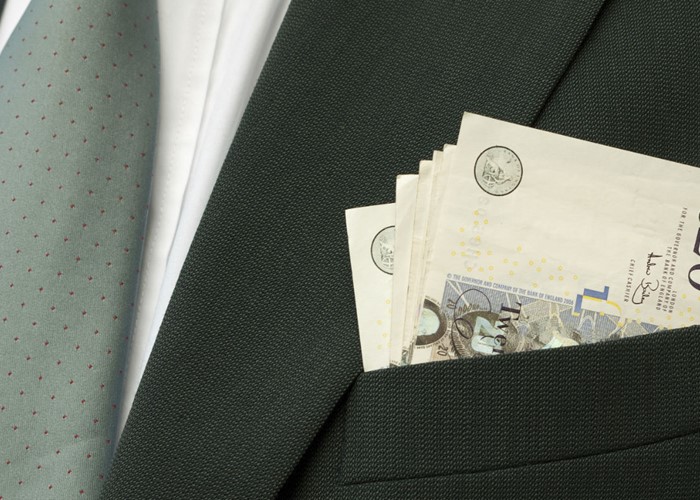Dodgy lawyers running off with Stamp Duty payments

According to the Legal Ombudsman, unscrupulous lawyers are making off with the Stamp Duty payments that you think you've paid to the taxman.
Can you trust the professionals? It's generally a good idea not to blindly accept the suggestions of financial advisers, but what about lawyers and accountants? They are the ones to whom we hand over huge sums when buying property, whom we expect to get our tax affairs right. And who are we to question them?
But no matter how much you pay them, when it comes to dealing with the taxman, it's your responsibility to pay the right amount, whatever you are advised.
And, as an increasing number of home buyers have found, paying your solicitor or conveyancer the Stamp Duty is not the same as the cash arriving at HMRC. The taxman doesn't do excuses, and won't accept your payment to a third party as proof of payment. You'll have to find the cash all over again if your professional person disappears or “loses” the money.
According to the Legal Ombudsman Service, which says 20% of its case load concerns property transactions, dodgy lawyers running off with Stamp Duty cash is a big problem. And it is made worse because HMRC says the responsibility for payment is with the home buyer. After the first 30 days following the property acquisition, interest charges and penalties may be applied too.
In almost all cases, home purchasers have no spare cash to repay a bill (plus extras) which they assume has already been handed over because they have given their lawyer the money. The HMRC bill can arrive months or even years after the new owners move in.
Compare mortgages with lovemoney.com
How the scam works
The Legal Ombudsman cites the case of a Mr A who paid for legal help when he bought his new family home. He used a lawyer specialising in conveyancing whose responsibility it was to pay £10,500 in Stamp Duty land tax to HMRC on a property then worth around £350,000. Mr A sent the money to the lawyer's bank account and thought no more about it.
Four years later, he received a letter out of the blue from HMRC. It stated that it had not received the Stamp Duty he owed and that he must pay it along with interest. taking it up to £12,000.
He was shocked and upset. He had paid once already and did not have £12,000. The law firm had gone out of business so he could not complain to them.
But he was aware of the Legal Ombudsman which ordered the firm to pay the money.
The delay was not due to HMRC incompetence, but because it had only recently discovered that the defunct law firm's racket was reporting a lower sale price, so pocketing the “excess”.
Stamp duty is a “slab” tax – it goes up in big amounts at certain key points such as £250,000 and £500,000 (why you price a house at £249,999 and never £250,001). The duty on a £260,000 purchase is £7,800 but on £245,000 it's just £2,450 so a bent lawyer can grab £5,350 by under-reporting the sale price.
In Mr A's case, there was satisfaction. The Ombudsman ordered the firm to cough up the cash. As it was bust, the bill went to the Solicitors' Regulatory Authority's compensation fund.
Compare mortgages with lovemoney.com
My own experience
There are plenty more stories like that in the Legal Ombudsman archive. But here's a cautionary tale about an accountancy firm which happened to me.
Many years ago, I followed my accountant's advice on claiming expenses on my Income Tax return.
“It'll be fine,” he said when I questioned how I could ever justify such a sum. It was for a relatively small amount, but involved exaggeration.
It was not fine. It was challenged. My accountant suggested I write a letter to explain the “mistake”. He then charged me £1,000 (plus VAT) for the missive which I had penned except for an opening and closing paragraphs.
I refused to pay, came to a quick agreement myself with the taxman and sacked the accountant. Since then, I have always filed my own returns.
My lesson was not to rely on professionals.
When it comes to HMRC, the rules are clear. You are responsible because you sign the form, no matter how many expensive accountants you hire.
The Legal Ombudsman reckons that HMRC should change its rules on this. But until that happens – and don't hold your breath - if you feel you have reason not to trust your lawyer completely, ask for the full paperwork and an HMRC confirmation of payment.
Compare mortgages with lovemoney.com
More on scams:
Legal aid cuts mean we're more at risk from fraudsters than ever before
We must act on these 0203 phone number scammers
The sneaky Companies House scam
Don't be duped by the Council Tax fraudsters
Comments
Be the first to comment
Do you want to comment on this article? You need to be signed in for this feature